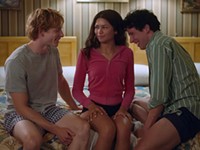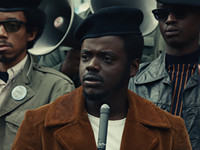[
{
"name": "500x250 Ad",
"insertPoint": "5",
"component": "15667920",
"parentWrapperClass": "",
"requiredCountToDisplay": "1"
}
]
A darkly funny and perceptive comedy about motherhood, depression, and dreams deferred, "Tully" brings director Jason Reitman and screenwriter Diablo Cody together for their third successful collaboration after "Juno" and "Young Adult."
The pair also reunite with their "Young Adult" star Charlize Theron, who plays Marlo, an overwhelmed 40-something wife and mother raising two children, with a third on the way. Marlo's daily existence has been subsumed by the exhaustion of raising a daughter and dealing with the special needs of a neuroatypical son whose "quirky" behavior his school has grown increasingly unable to deal with.
Her husband Drew (Ron Livingston) -- with whom she shares a stable, but not terribly exciting, marriage -- is little help. Drew's a decent guy, happy to help with homework and making lunches, but during those endless days he's off to work or away on business, the lion's share of the childcare responsibilities fall to Marlo. During Drew's nights at home, he joins the family for dinner, then adjourns upstairs to play video games before conking out and waking up to do it all over again.
Lost in the quotidian monotony of feedings, diaper changes, and breast pumping, Marlo doesn't have a single moment for herself. And between the exhaustion and constant stress of needy children, Marlo feels she's slowly losing her mind.
Sensing Marlo nearing the end of her rope, her wealthy brother Craig (Mark Duplass) hires her a night nanny to come in during the evening hours to look after her newborn. He makes a vague, pointed reference to a postpartum depression following her last pregnancy, and he's worried she may be sprinting toward another breakdown.
Marlo's resistant at first, wary of allowing a stranger to raise her child, even for a few hours during the night. Visions of murderously unhinged nannies out of a dozen bad Lifetime movie whirl through her head, but after a particularly difficult day, she reaches her limit and finally agrees.
Enter free-spirited, 26-year-old Tully (a wonderful Mackenzie Davis). Like a millennial Mary Poppins, she tends to the infant through the night, gently waking Marlo for feedings, but allowing her the chance to get the full night's sleep she's been deprived of for years. With that renewed energy, Marlo's suddenly able to not only reconnect with the woman she once was, but become the mother she's always wished she could be. Tully is a miracle, and Marlo doesn't know how she ever lived without her.
Tully sees it as her duty not only to care for the new baby, but its mother as well, and gradually she becomes more of a friend and confidante to Marlo. The evolving relationship between the two women forms the crux of the movie, though both women aware that, by the nature of their professional agreement, it isn't sustainable. Theron and Davis have a wonderful chemistry during their characters' long conversations; Theron's flinty weariness contrasts delightfully with Davis' warm, somewhat enigmatic portrayal.
After years struggling to be taken seriously as an actress, Theron finally broke through with her Oscar-winning portrayal of serial killer Aileen Wuornos in "Monster," and she hasn't stopped proving that she's one of the most talented and versatile actresses working today. She gives another extraordinary performance here; her face a mask of fatigue, Theron lets glimmers of the young, fun person Marlo used to be to break through every so often, making it all the more heartbreaking that they're so rare.
"Tully" was inspired by Cody's experiences raising three children of her own, and her script is detailed and observant in a way that's brutally honest about the decidedly unglamourous side of motherhood. Becoming a parent means giving up on the idea of living entirely for oneself, but can too often mean losing track of who that person was in the first place.
There's a risky shift late in the film that sends the narrative spinning in a new direction. At first, the shift didn't seem entirely necessary, but it's grown in resonance the more I've thought about it, and I suspect it might very well play better upon a second viewing.
As it goes on, the film touches on some universal ideas, about how we set certain expectations for the course our lives will take, and the way those paths can shift imperceptibly over time without our realizing it. Those alterations aren't necessarily good or bad, the film argues, though evaluating our happiness based solely on how closely we stick to those original paths is a recipe for misery.
Sometimes resembling an adult fairytale, "Tully" offers a take on motherhood that's a more melancholy and significantly darker than "Juno," though its emotional, humane character study is something of a return to form for Reitman after the missteps of "Labor Day" and "Men, Women & Children." Through bracing honesty, the film presents its audience with plenty of opportunities to laugh and wince in recognition, whether you're a new parent or not.












